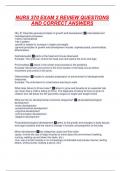NURS 370 EXAM 2 REVIEW QUESTIONS
AND CORRECT ANSWERS
Obj. #1 Describe general principles of growth and development ✅-interrelated and
interdependent processes
-highly individualized
-has a pattern
-growth is related to increase in height and weight
-general principles of growth and development include: cephalocaudal, proximodistal,
differentiation
Cephalocaudal ✅starts at the head and moves downward
Example: The child can control the head and neck before the arms and legs.
Proximodistal ✅-starts in the center and proceeds to the periphery
Example: Movement and control of the trunk section of the body occurs before
movement and control of the arms.
Differentiation ✅-simple to complex progression of achievement of developmental
milestones
Example: The child learns to crawl before learning to walk.
What does failure to thrive mean? ✅failure to grow and develop at an expected rate
can mean that a child is failing to thrive. The diagnosis of failure to thrive is given to
children who fall below the 5th percentile ranges on height and weight charts
What are the six developmental outcomes categories? ✅-physical/physiological
development
-motor development
-social/emotional development
-cognitive development
-communication development
-adaptive development
Physical/physiological development ✅refers to the growth and changes in body tissues
and organ systems and the result of change in function and proportion of the body
Motor development ✅two categories: gross and fine motor
-gross: involve the use of large muscles to move about the environment (walking,
running, walking up and down the stairs, etc.)
-fine: use of small muscles in an increasingly coordinated and precise manner (writing
letters, writing words, holding a pencil, etc.)
,Social/emotional development ✅-development of self understanding, understanding
others, and understanding social interactions
-knowledge of social/emotional skills is critical because it directs effective
communication
Cognitive development ✅-working memory capacity, cognitive self regulation, and the
processing and use of information about the environment and objects in the
environment
-these processes underlie the development of critical thinking skills and execute
functioning which includes learning, forming concepts, understanding, problem solving,
reasoning, remembering, and thinking abstractly
Communication development ✅-simple speech begins with utterances of consonants
which then increases to include vowels then single words are formed and then two and
three word combinations arise, leading to the development of meaningful phrases and
sentences
-language explosion is a demonstration of frontal lobe development and typically occurs
in children 18 mo- 3 years of age
Adaptive development ✅-refers to skills that enable independence at home and in the
community
-adaptive skills are learned and include self care activities such as dressing/undressing,
eating and feeding, tolieting, grooming, etc.
Categories of development ✅physical/physiologic, motoric, social/emotional, cognitive,
communication, adaptive
Obj. #2 Define cognitive growth and development according to Jean Piaget: identified
the following characteristics of cognitive development ✅-development is a sequential
and orderly process, moving from stages that are simple to complex
-cognitive acts occur as the child adapts to the surrounding environment
-the child's experience with the environment naturally encourages growth and
maturaiton
-child must accommodate new or complex problems by drawing on past experiences
-there can be overlap between the Childs age and stage of development
Developmental milestones: fine motor ✅-Birth to 1 month: open fingers slightly at rest
-2 to 3 months: grasps toys, open and closes hands, eyes follow object to midline,
blows bubbles
-6 to 8 months: bangs objects on table and can transfer object from hand to hand
-1 year: Can hold crayon and may mark on paper, begins to use objects correctly
-2 to 3 years: learning to dress self and can draw simple shapes
-4 to 5 years: dresses independently and uses scissors
, Developmental milestones: gross motor ✅-birth to 1 month: arms and legs move
together and holds chin up when lying on stomach
-2 to 3 month: raises head and chest when lying on stomach, supports upper body with
arms when lying on stomach
-6 to 8 months: can roll from side to side, can sit unsupported by 7 or 8 months,
supports whole weight on legs
-1 year: pulls self up to stand, walks holding on to furniture, may walk two steps
independently
-2 to 3 years: jumps, kicks balls, learning to pedal tricycle
-4 to 5 years: goes up and down stairs independently, throws a ball overhand, hops on
one foot
Piaget's Key Stages ✅Sensorimotor - Birth to 2 yearspreoperational - 2 to 7
yearsconcrete Operational - 7 to 11 yearsformal Operational - 11 Years to Adulthood
Piaget-what is stage one of sensorimotor? ✅Reflexes: The child learns through motor
and reflex actions and begins to understand that he or she is separate from the
environment and from others. Learning through sucking
Piaget - what is the second stage of sensorimotor? ✅1-4 months
Primary circular reactions: finding of thumb, found it helped sooth themselves, so
continues this actions
Piaget- what is the third stage of sensorimotor? ✅4-8 months
Secondary circular reactions: putting rattle in mouth
Piaget- what is the fourth stage of sensorimotor? ✅8-12 months
Coordination of secondary schemata: shaking of the rattle to make sound
Piaget- what is the fifth stage of sensorimotor? ✅12-18 months
Tertiary circular reactions: making verbal sounds to see if he will illicit a response
Piaget- what is the sixth stage of sensorimotor? ✅18-24 months
Interventions of new mental combinations: starting to understand for example a bowl
and spoon means a meal is coming
Object permanence ✅-Around 8 months
-one of the most important developments in the sensorimotor stage. The child knows
that an object exists even when it cannot be seen or heard. This is a great time to
introduce the game peekaboo, by the end of this stage the child will understand that you
did not disappear just because your hands are over your face.
Piaget - Preoperational (Application of Language) ✅-2 to 7 ears old
-Egocentric, magical thinking
-in this stage the child is unable to take the view of others




